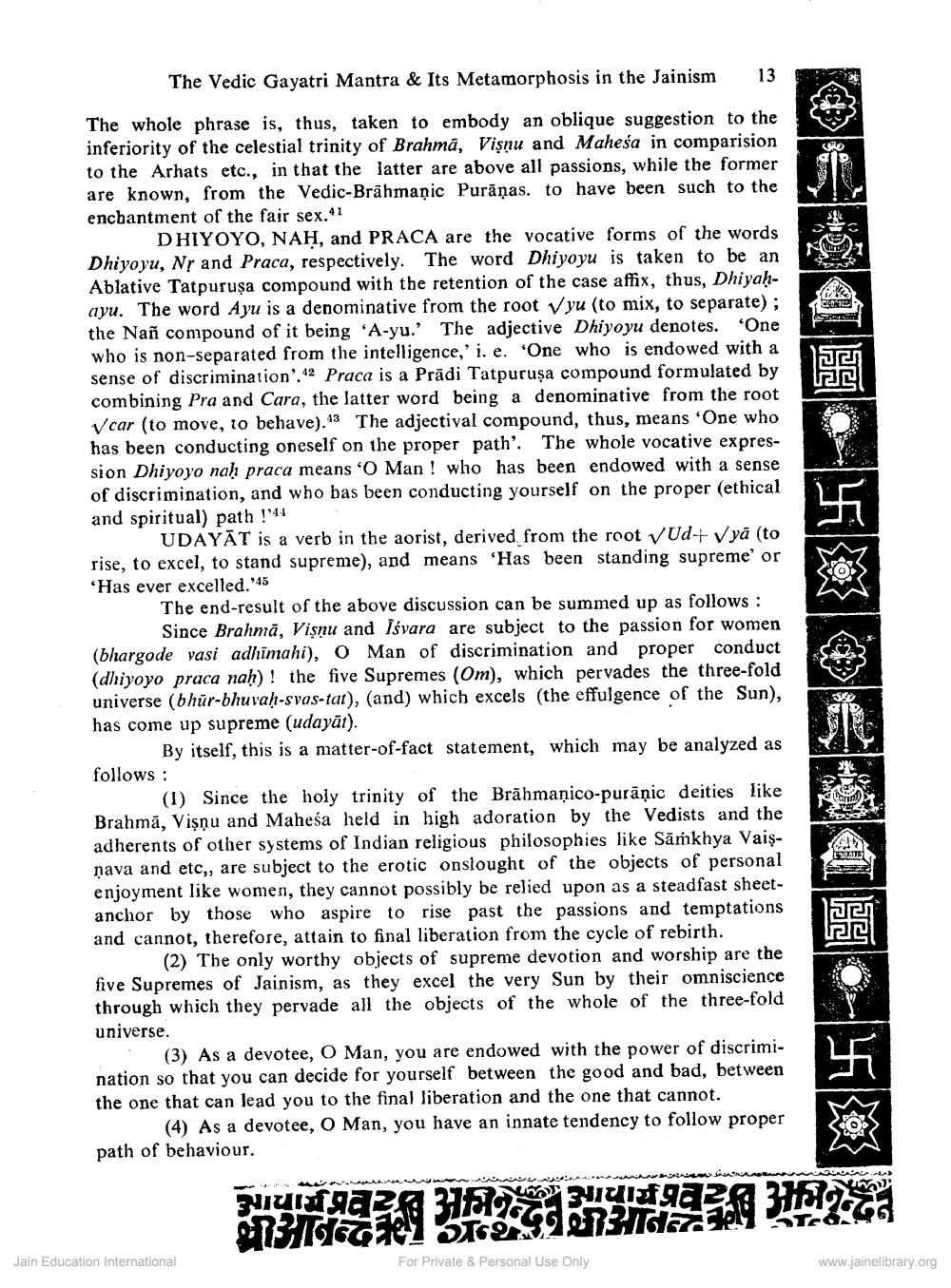Book Title: Vedic Gayantri Mantra and its Metemorophosis In The Jainism Author(s): N M Kansara Publisher: Z_Anandrushi_Abhinandan_Granth_012013.pdf View full book textPage 6
________________ The Vedic Gayatri Mantra & Its Metamorphosis in the Jainism 13 The whole phrase is, thus, taken to embody an oblique suggestion to the inferiority of the celestial trinity of Brahmā, Vişnu and Mahesa in comparision to the Arhats etc., in that the latter are above all passions, while the former are known, from the Vedic-Brāhmaṇic Purāņas. to have been such to the enchantment of the fair sex.41 DHIYOYO, NAH, and PRACA are the vocative forms of the words Dhiyoyu, Nr and Praca, respectively. The word Dhiyoyu is taken to be an Ablative Tatpuruşa compound with the retention of the case affix, thus, Dhiyahayu. The word Ayu is a denominative from the root Vyu (to mix, to separate); the Nañ compound of it being 'A-yu.' The adjective Dhiyoyu denotes. “One who is non-separated from the intelligence,' i. e. 'One who is endowed with a sense of discrimination'.42 Praca is a Prādi Tatpuruşa compound formulated by combining Pra and Cara, the latter word being a denominative from the root V car (to move, to behave).43 The adjectival compound, thus, means 'One who has been conducting oneself on the proper path'. The whole vocative expression Dhiyoyo naḥ praca means 'O Man ! who has been endowed with a sense of discrimination, and who bas been conducting yourself on the proper (ethical and spiritual) path !:44 UDAYĀT is a verb in the aorist, derived from the root Ud-+ Vya (to rise, to excel, to stand supreme), and means 'Has been standing supreme' or 'Has ever excelled.'45 The end-result of the above discussion can be summed up as follows: Since Brahma, Vişnu and Isvara are subject to the passion for women (bhargode vasi adhimahi), O Man of discrimination and proper conduct (dhiyoyo praca nah)! the five Supremes (Om), which pervades the three-fold universe (bhür-bhuvaḥ-svas-tat), (and) which excels (the effulgence of the Sun), has come up supreme (udayāt). By itself, this is a matter-of-fact statement, which may be analyzed as follows: (1) Since the holy trinity of the Brāhmaṇico-purāņic deities like Brahma, Vişnu and Mahesa held in high adoration by the Vedists and the adherents of other systems of Indian religious philosophies like Sāṁkhya Vaişnava and etc,, are subject to the erotic onslought of the objects of personal enjoyment like women, they cannot possibly be relied upon as a steadfast sheetanchor by those who aspire to rise past the passions and temptations and cannot, therefore, attain to final liberation from the cycle of rebirth. (2) The only worthy objects of supreme devotion and worship are the five Supremes of Jainism, as they excel the very Sun by their omniscience through which they pervade all the objects of the whole of the three-fold universe. (3) As a devotee, O Man, you are endowed with the power of discrimination so that you can decide for yourself between the good and bad, between the one that can lead you to the final liberation and the one that cannot. (4) As a devotee, O Man, you have an innate tendency to follow proper path of behaviour. niewinnas zuunaaz CIENCE 5720970130 3877 Jain Education International For Private & Personal Use Only www.jainelibrary.orgPage Navigation
1 ... 4 5 6 7 8 9
